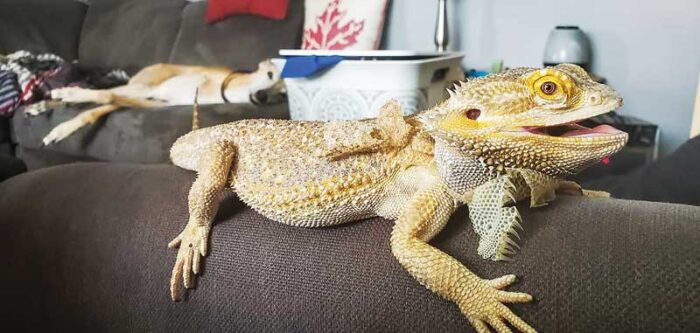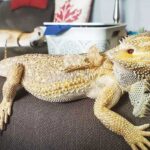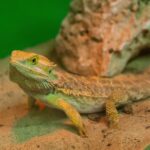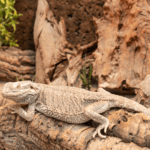As a devoted bearded dragon owner, you put careful effort into keeping your exotic pet happy and healthy in captivity. But even with the best at-home husbandry, concerning health issues can crop up over a bearded dragon’s decade or longer lifespan. Knowing when to seek veterinary care is key to getting ahead of problems before they intensify.
Read on for clear signs your bearded dragon needs to see an exotics-focused vet for a checkup or intervention.
Importance of Preventative Vet Visits
The old adage “an ounce of prevention is worth a pound of cure” very much applies to bearded dragons. Schedule annual wellness exams to catch issues early plus establish a baseline for your dragon’s healthy state even when they seem fine at the moment. Preventative bloodwork, parasite checks, and other diagnostics further bolster insights into subtle health changes.
Your vet also tracks ongoing growth status against breed standards at each visit. Undersized or overweight dragons may require revised nutrition and husbandry plans to get back on track developmentally. Preventative care tailored to life stage optimizes quality of life and longevity.
Concerning Signs To Watch For
In between regular well visits, remain alert to these common indicators of emerging health problems in bearded dragons warranting prompt veterinary assessment:
Appetite Changes
Healthy dragons eagerly consume appropriately sized feeder insects multiple times weekly. Loss of appetite lasting over 48 hours always warrants evaluation for potential illness or gastrointestinal issues. Conversely, unusually ravenous eating paired with rapid weight loss points to parasite problems.
Appearance Changes
Dragons’ spikes and skin coloration tie closely to mood – darker colors and flatter positioning signal stress or feeling unwell. Conversely, abnormal swelling around limbs or joints indicates injury or fluid retention syndromes needing medication.
Posture & Movement Issues
Healthy bearded dragons move often to precisely regulate their body temperature. Lethargy, muscle twitching, limb tremors, dragging legs and tilting posture all require prompt veterinary insight to identify mobility disorder causes ranging from vitamin deficiencies to genetics.
Discharge or Injuries
Runny noses, puffy eyes, oozing wounds and retained shed skin stuck on limbs all benefit from medications to resolve. Always have injuries evaluated for potential pain control needs too.
Irregular Defecation & Urination
Digestive slowdowns lead to constipation in dragons, especially with poor hydration intake. Straining repeatedly to pass waste plus darkened urate portion of droppings points to organ trouble. Diarrhea also risks dehydration without anti-diarrheal medication support.
Labored Breathing
Wheezing, mouth gaping, exaggerated breathing motion or stretched out neck positions signal respiratory distress from infection or blockage – scenarios requiring urgent vet intervention to prevent fatal declines.
Anxiety & Unusual Behavior
Glass surfing along habitat walls, jumping repeatedly despite missing limbs, aggression and hiding constantly are abnormal behaviors tied to deeper issues. Underlying causes span husbandry flaws, neurological disease and liver problems – all benefiting from prescription treatment plans.
When To Rush Your Bearded Dragon to Emergency Care
While most scenarios allow reasonably prompt same week veterinary appointments, at home owners must know the subtle signs of true reptile health emergencies requiring emergency immediate care. Rush your bearded dragon to the nearest exotics-experienced emergency vet clinic if you observe:
– Seizure activity
– Complete limb paralysis
– Unconsciousness
– Profuse bleeding from injuries
– Severe vomiting/diarrhea leaving dragon severely lethargic
Catching exotic pet emergencies fast gives dragons the best chance of effective life-saving treatment once the underlying trigger gets diagnosed. Always call ahead so staff prepare a reptile-safe space since many general practices lack proper heating tools on standby.
How To Find a Qualified Reptile Vet
Not all veterinary clinics have extensive exotic pet medicine experience. Finding one proficient in bearded dragons before emergencies strike saves critical time. Here’s how to identify qualified exotics-focused vets:
– Confirm advanced reptile training credentials
– Check for membership in the Association of Reptile and Amphibian Veterinarians
– Validate they treat bearded dragons routinely
– Ask about common health issues like metabolic bone disease protocols
– Request tour of reptile boarding/hospitalization facilities
Once satisfied with competencies and specialized services, establish your bearded dragon as a new patient for routine well visits plus emergencies. The investment offers peace of mind someone intimately understands your pet’s baseline status when health crises emerge.
Provide The Most Helpful Background Details
To enable accurate diagnoses and treatment plans tailored to your bearded dragon’s history and environment, provide extensive background details. This includes:
– Dragon’s age & how long in your care
– Breeder sourced from if applicable
– Gender, genetic history and related details
– Enclosure dimensions, heating/lighting and other equipment in use
– Exact temperatures maintained across cool and warm ends
– Types of substrates and décor items within habitat
– Complete daily diet including all feeder insects, greens and supplements
– Watering techniques
– Typical dragon activity patterns and behavior
Such exhaustive household data coupled with change onset timing assists vets pinpointing likely illness triggers specific to your bearded dragon’s world. Ongoing logging throughout future appointments further optimizes diagnostic accuracy.
Partner with Your Veterinarian
Herp medicine continues advancing all the time. Forming a collaborative partnership with your reptile-focused vet leverages their constantly expanding knowledge to your bearded dragon’s benefit. Together you’ll make the best decisions for maintaining lifelong wellness tailored to your exotic pet’s evolving needs across every life milestone. Consistent preventative care and prompt issue diagnosis gets problems managed simply before they spiral out of control.






:max_bytes(150000):strip_icc()/13-f9fc54bc64854d20b43e00db91a9cb16.jpg)